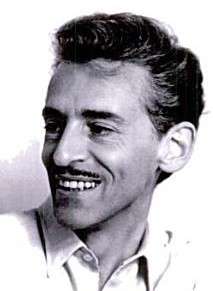Robert Piguet
Robert Piguet (1898 – 1953) was a Swiss-born, Paris-based fashion designer who is mainly remembered for training Christian Dior and Hubert de Givenchy.[1] The Piguet fashion house ran from 1933 to 1951; since then, the brand Robert Piguet has been associated exclusively with fragrances.[2]
Robert Piguet | |
|---|---|
 Robert Piguet | |
| Born | 1898 Yverdon-les-Bains, Switzerland |
| Died | 1953 (aged 54–55) Lausanne, Switzerland |
| Nationality | French |
Label(s) | Robert Piguet |
Early life and education
Piguet was born in Yverdon-les-Bains in Switzerland,[3] in 1898, according to the Swiss Fashion Museum, the Musée suisse de la Mode, which holds his archives,[4] although many other sources give an alternative birth year of 1901.[3][5] In Paris Couturiers and Milliners, published in 1949, Piguet is said to have been 17 in 1918.[6]
Career
The young Piguet originally trained to be a banker, like his father, but preferred fashion design, much to his father's disapproval.[6] In late 1918, just after the end of World War I, he decided to go to Paris to pursue his vocation.[6]
Initially, Piguet began working with Paul Poiret, before being poached by the Paris branch of Redfern.[8] In 1932, an American author writing on Paris fashion commented that the American cartoonist 'would probably select Robert Piguet, the designer at Redfern's, as the ideal Parisian dressmaker.'[8]
In 1933, Piguet launched his own fashion house.[4] Eleanor Lambert described him as known for '"thin suits" and tasteful day dresses,'[5] whilst Vogue declared him the 'master of the little wool dress'.[9] He is perhaps best known for giving Christian Dior his big break in 1937, allowing him to design for three collections.[10][11] Dior later said: 'Robert Piguet taught me the virtues of simplicity through which true elegance must come.'[12][13] One of Dior's designs for Piguet, a day dress called 'Cafe Anglais' with a short and full skirt was particularly well received.[10][11] While at Piguet, Dior worked alongside Pierre Balmain, and was succeeded by Marc Bohan as house designer.[11] In addition to Dior, Bohan and Balmain, other designers who had an early start with Piguet included James Galanos and Hubert de Givenchy.[14][15]
Piguet's archive, consisting of 3,000 original designs, photographs and documents, is held by the Musée suisse de la Mode, in his birthplace, Yverdon-les-Bains.[4]
Perfumes
In collaboration with Germaine Cellier, Robert Piguet launched his first perfume Bandit (created 1942) in the USA in 1944,[16] with a dramatic presentation featuring models with guns and knives, one of whom is said to have smashed a bottle of the fragrance on the floor.[12][17] His most successful fragrance was Fracas (1948), also co-developed with Cellier - an updated version of which was inducted into the FiFi Awards's Hall of Fame in 2006.[12] Other fragrances developed under Piguet's supervision were Visa (1945) and Baghari (1950).[12] Following Piguet's death, fragrances such as Cravache (1963) and Futur (1960s) continued to be developed under his name, although 'Robert Piguet' gradually fell from public awareness until being bought by the American company Fashion Fragrances & Cosmetics Ltd in 1993.[12][18]
References
- Fukai, Akiko (2002). Fashion : the collection of the Kyoto Costume Institute : a history from the 18th to the 20th century. Translated by Dominic Cheetham. Köln [etc.]: Taschen. p. 548. ISBN 9783822812068.
- "The Encyclopaedia of Perfume: Volume B Chapter 1: B - Bean Blossom Page 4". Perfume Intelligence. Retrieved 24 April 2014.
- Reeder, Jan Glier (2010). High style : masterworks from the Brooklyn Museum Costume Collection at the Metropolitan Museum of Art. New York: Metropolitan Museum of Art. p. 225. ISBN 9781588393623.
- "Collections: Musée suisse de la Mode" (in French). Musée suisse de la Mode, Switzerland. Retrieved 24 April 2014.
- Lambert, Eleanor (1976). World of fashion : people, places, resources. New York: R.R. Bowker Co. p. 333. ISBN 9780835206273.
- Perkins, Alice K. (1949). Paris Couturiers and Milliners. Fairchild Publications. p. 35.
- Taryn Benbow-Pfalzgraf, ed. (2002). Contemporary fashion (2. ed.). Detroit [u.a.]: St. James Press. p. 537. ISBN 9781558623484.
- Wilson, Robert Forrest (1932). Paris on Parade. Paris: R. M. McBride & Company. pp. 69–71.
When Redfern took young Robert Piguet away from Poiret, it was a great business stroke for the house, which had fallen into one of those aristocratic declines which sooner or later overtake all the older establishments when their designers grow conservative and come to regard the latest fancies as just a little bit mad if not actually out of taste.
- Watson, Linda (2001). Twentieth century fashion designers, N-Z. Philadelphia: Chelsea House Publishers. p. 11. ISBN 9780791061961.
- Marly, Diana de (1990). Christian Dior. London: B.T. Batsford. p. 12. ISBN 9780713464535.
Dior designed three collections while at Piguet's, and the most famous dress he created then was the Cafe Anglais...
- Pochna, Marie-France (1996). Christian Dior : the man who made the world look new. Translated by Joanna Savill (1st English language ed.). New York: Arcade Pub. pp. 62, 72, 74, 80, 102. ISBN 9781559703406.
- Grainger, Nathalie (2010). Quintessentially perfume. London: Quintessentially Pub. Ltd. p. 125. ISBN 9780955827068.
- Picken, Mary Brooks; Dora Loues Miller (1956). Dressmakers of France: The Who, How, and why of the French Couture. Harper. p. 105.
- Clade, Jean-Louis (2008). Se vêtir : Art et histoire de plaire. Yens-sur-Morges: Cabédita. p. 165. ISBN 9782882955265.
- Pendergast, Sara (1997). Contemporary designers (3rd ed.). Detroit: St. James Press. p. 48. ISBN 9781558621848.
- "The Encyclopaedia of Perfume: Perfume Houses Volume P / Chapter 1 / Page 5". Perfume Intelligence. Retrieved 24 April 2014.
- Herman, Barbara (2013). Scent and subversion decoding a century of provocative perfume. Globe Pequot. p. 101. ISBN 9781493002016.
- Williams, Tessa (2013). Cult Perfumes, The World's Most Exclusive Perfumeries, p.151. Merrell, London. ISBN 978-1-8589-4577-4
Online links
- "Robert Piguet Parfums". - Official site for the current company
- "Robert Piguet at Fragrantica".
- "Interview with Joe Garces, creative director of Robert Piguet Parfums".